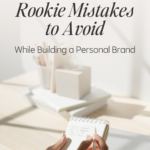
Building a Personal Brand? 10 Rookie Mistakes to Avoid
Table of Contents
ToggleSharing is caring!
Reading Time: 5 minutes
When you’re promoting yourself – as a personality and/or as a business – you’re telling your story; you’re revealing parts of yourself to appeal to a greater audience.
A personal brand exists whether or not you’ve created it for your business. Every piece of content you put out there is infused with your unique personality. The concept of personal branding may not be new, but there are definitely pitfalls to be avoided so you don’t end up confusing your customers.
You already know the benefits of building a personal brand, but what about the common mistakes to avoid?

10 Rookie Mistakes to Avoid for Building a Personal Brand
Diluting Your Audience
Casting too wide of an audience net sounds like a good idea when you’re eager to attract attention as you build your brand, but this is one mistake that needs to be corrected right away. You don’t want to appeal to too many people because your business isn’t meant to please everyone. Your personal brand should only attract people who have a genuine interest in what you say, what you share, and what you sell! Keep your keynotes, social media posts, and content focused on a specific group of people because the narrower your target demographic, the bigger your business becomes.
Focusing on Academic or Technical Credentials
When you’re a decorated solopreneur, there’s always the temptation to highlight your achievements and qualifications for everyone to see. No shame in showing what you’ve got, but the question is, can your audience relate?
Building a personal brand is all about being relatable. Not everyone in your target demographic has achieved the things you’ve achieved, and if that’s the topic, not many of them will pay attention to it simply because they cannot relate. And if they cannot relate to you, your target audience will move on to brands they feel connected to.
Keep your content simple, valuable, and engaging. Avoid technical jargon and focus on solving problems. Let your credentials show when people do their research on you.
Choosing Frequency over Authenticity
When you’re just starting out, you tend to focus too much on the algorithm, endlessly strategizing ways to get your metrics up. You are pressuring yourself to publish content every day to stay at the top of your target audience’s mind. At some point, you are focusing too much on the algorithm that you’re posting just for the sake of it.
To build a successful personal brand, you have to stay true to yourself. It sounds cheesy, but authenticity is something that hooks the viewers in. You want to tell a story, provide information that helps people. Generic content will never get you anywhere because online users are smart; they value authenticity. Do not trade frequency for authenticity, or you risk losing your precious audience.
Putting Other Brands Down to Build Your Own
Competition between brands will always be there but stop short at putting other brands down just to make yours look good. Always play nice — avoid making unnecessary jabs at other brands because you don’t want your brand to be known for putting others down. Focus on helping people, not creating hostility between you and your competitors. You can learn a thing or two from the competition, and you are only making your world too small if you’re creating tension in the industry.
Changing Your Story
Your business will undoubtedly, change over the years, but you have to stay consistent with your brand story. Your story is the reason why people come to you in the first place. They want to get to know you; they want to learn more about your passions, advice, and journey because your story stuck to them.
Storytelling is a huge part of your marketing strategy, so you shouldn’t drift away from it. If you are not sticking to your story, you’ll end up confusing your target audience. Each time you’re creating pieces of content for marketing, you need to think about ways to spin your story to teach people and build your brand. Every piece of content you put out there should be a part of your branding story.
Inconsistent Message
A clear and consistent message is key to effective marketing. Your marketing message should be consistent and focused; otherwise, it won’t make a real impact on your audience. If your brand is focused on beauty tips, your marketing messages should be related to anything beauty, not accounting. You don’t have to please everyone by changing your marketing message and being all things to all people. You just need to focus on people who are genuinely interested in your brand.
Misaligned Personal And Professional Brands
You can’t promote healthy eating as a fitness guru on your professional brand, then talk about binge eating on sweets on your personal brand. You’ll confuse people this way. While your professional brand shouldn’t always align with your personal brand, they must have something in common.
We live in a world where people can track brand owners within seconds. And if your personal and professional brands are at odds with each other, you’ll end up losing your core audience. Remember, authenticity is a huge part of online promotions and personal branding. You have to stay consistent to show your viewers that you are 100% genuine and dedicated to your personal journey.
Hiding a Different Side of Your Personality
As solopreneurs, we want to be taken seriously, and perhaps, that’s the reason why some tend to show only their “professional” side, hiding their silliness behind serious-sounding copies and shoutouts. We could all use a laugh, especially during these dark, uncertain times.
Don’t be shy to break “protocols” by poking fun at yourself, showing your fun, silly side, or cracking a joke. Showing a different side of your personality helps humanize your brand. By letting customers see the human side of your brand, they’re more likely to be drawn to the marketing message. Showing your silly side will strengthen your personal brand because fun is engaging, and engaging sells.
Being Afraid to Say the Wrong Thing
As a brand, you can’t please everyone. You might not share the same opinions as others and sometimes, you might say things that not all people can agree on. That’s okay! As much as you want to please people every time you put your opinion out there, you can’t. But don’t let your fear of saying the wrong thing keep you from expressing yourself, both as a person and as a brand.
Having no opinion or having opinions that change with the season will only lead to much distrust. You want your customers to get to know you as a brand. And you cannot build trust in your brand if you’d rather stay away from conversations just because you don’t want to ruffle some feathers! Remember, you are an expert in your industry. You specialize in what you do, and you’re here to provide solutions, not become anyone’s yes man. Having shared and conflicting values and opinions with everyone comes with the territory.
Using a Fake Image
There are businesses that put up a carefully curated image to protect their brand. But if you want to grow a personal brand that connects with viewers, don’t bother with a fake image. People know a sham when they see one and you don’t want to be seen as a brand that misleads customers. Also, it’s hard to sustain a brand that’s built on a fake image.
Be natural, be you. It’s okay to be imperfect because your real-life stories will resonate with your viewers and create a connection. Everything becomes nothing if you cannot be yourself.
Inspire others by knowing yourself, understanding who you are, and finding ways of marketing your brand based on your unique, authentic self. If you’re not being true to yourself, you’re not true to your audience. And when people see that you’ve been faking it all along, you will lose your customers.
Personal branding is all about putting a face behind your brand and that’s a good thing. Personal branding is all about authenticity too. You want a brand that’s relatable and provide a safe space where people can be themselves and share their authentic story.
It’s possible to develop a stronger online presence, widen your network, and become a respected personality in your niche industry by building a personal brand.
Most Popular Posts:
Sharing is caring!
PLEASE COMMENT BELOW